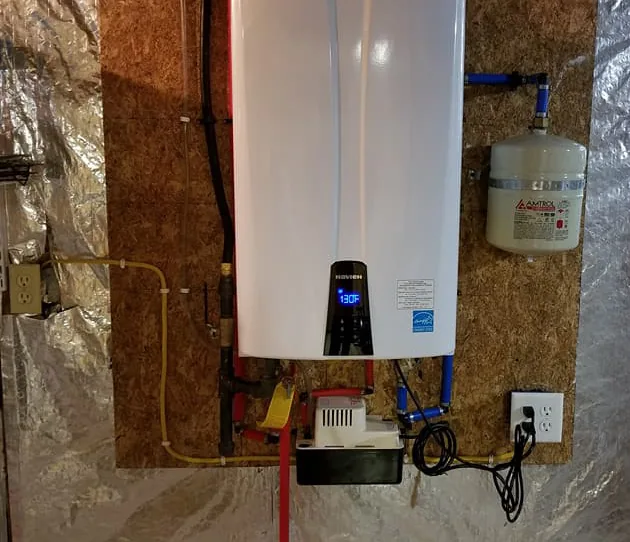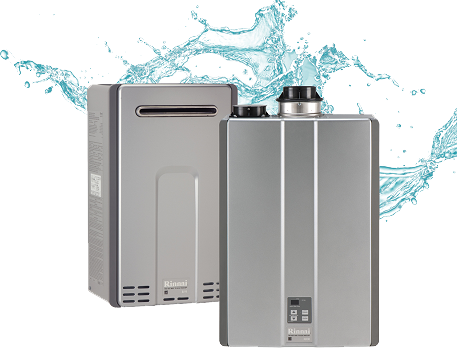How Tankless Water Heaters Grant Key Benefits
How Tankless Water Heaters Grant Key Benefits
Blog Article
The article listed below in relation to Unveiling the Hot Trend: The Benefits of Tankless Water is fairly enjoyable. You should investigate it.

In a world where ease and effectiveness reign supreme, it's not a surprise that home owners are continuously in search of smarter ways to manage their home's power intake and convenience. One advancement that has continuously obtained appeal is the tankless water heater. But just what makes these systems attract attention from the traditional tank-based versions a lot of us matured with? Let's dive in and check out the benefits of tankless water heaters, helping you decide if it's time to make the switch in your house.
Intro
Picture this: you step into the shower after a long day, expecting a soothing cascade of warm water, just to be welcomed by icy beads because the last person utilized everything up. Noise familiar? Conventional water heaters store a fixed amount of warm water, suggesting you're at the grace of that storage tank's supply. Tankless systems, on the other hand, heat water as needed. Say goodbye to going out mid-shower, no more wrestling with timetables just to ensure hot water is available.
Recognizing Tankless Hot Water Heater
What Are Tankless Hot Water Heater?
Tankless hot water heater, in some cases called on-demand or instantaneous hot water heater, provide hot water only as it's needed. Rather than saving gallons of pre-heated water, these devices kick right into activity the moment you turn on the faucet. Water passes through a warm exchanger, warming up in real-time, indicating you obtain a continuous flow of hot water without the requirement for a large storage tank resting idly by.
Exactly how Do They Vary from Typical Solutions?
Standard heaters hold a reservoir of hot water, using energy to keep that container at a constant temperature. Tankless devices get rid of the standing supply, lowering lost power and the large footprint of a huge cylinder. Basically, you're upgrading from a "accumulation" state of mind to a "made-to-order" method.
Usual Kinds Of Tankless Devices
Tankless hot water heater usually come in 2 selections: gas and electric. Gas models often tend to provide higher flow prices, perfect for bigger homes, while electrical versions usually serve smaller homes and are typically much easier to mount. Furthermore, some systems are developed for point-of-use (serving one fixture) while others can manage the entire home's hot water demands.
Key Advantages of Tankless Water Heaters
Power Effectiveness and Cost Savings
Say goodbye to heating a giant container's worth of water and keeping it toasty all the time. Tankless heating units reduce standby energy losses, which can reduce utility bills. While the initial cost might be higher, the lasting financial savings commonly warrant the investment.
3. Space-Saving Style
If your home is short on storage, getting rid of the large storage tank frees up important area. Tankless units are compact and can usually be installed on wall surfaces, stashed in edges, or installed in tight utility wardrobes without hogging the whole area.
4. Longer Life-span
A well-maintained tankless water heater can outlive its tank-based cousin. Standard tanks might last 10-15 years, while tankless models can maintain downing along for two decades or more, making them a strong investment over time.
1. Countless Warm Water Supply
Ever had to schedule showers so everyone gets their fair share of warm water? With tankless, that becomes a thing of the past. As long as the heater's circulation ability isn't exceeded, you can take back-to-back showers without turning into a popsicle.
5. Improved Water Top Quality
Keeping water in a tank can sometimes bring about debris build-up or a slightly "off" taste. With tankless systems, fresh water is warmed right away, minimizing the chances of sediment buildup and potentially offering cleaner-tasting water.
Factors to consider Before Changing
Though the advantages are engaging, it's wise to think about a few variables prior to totally dedicating.
Reviewing Your Home's Water Usage Patterns
If your home at the same time makes use of several components with high hot water need, see to it the device's circulation price fulfills your demands. Understanding your usage patterns assists you select the best dimension and kind of tankless heating system.
Upkeep and Treatment Tips
Tankless systems are reasonably reduced maintenance, however they aren't set-it-and-forget-it appliances.
Regular Cleansing and Descaling
Hard water minerals can develop in the heat exchanger, affecting performance. Regular descaling (typically recommended annually) keeps the unit running at peak performance.
Annual Specialist Evaluations
A yearly checkup from a professional guarantees small issues are caught early. They'll analyze the system's efficiency, seek leakages, and assist maintain optimum efficiency.
First Investment Prices
Tankless heaters normally feature a greater upfront cost. Between the system itself and potential installment alterations, the preliminary cost might offer you sticker label shock. Yet bear in mind to see it as a lasting financial investment.
Installation Needs
Relying on your home's framework, you could require added electric capability or gas line upgrades. Ensure you understand the setup demands and seek advice from an expert to avoid shocks.
Ensuring Proper Ventilation
For gas versions, correct ventilation is essential to securely eliminate exhaust gases. Make sure airing vent systems are clean and properly mounted to stop any type of possible safety and security threats.
Contrasting Different Brands and Versions
Not all tankless water heaters are developed equivalent.
Researching Reputable Makers
Seek trustworthy brand names with a background of producing top quality systems. A reputable maker usually provides far better client assistance and longer guarantees.
Installment: Do It Yourself or Specialist?
While some property owners relish dealing with tasks themselves, tankless installation might not be the best time to break out the tool kit.
Advantages and disadvantages of Do It Yourself Installment
A do it yourself mount could save money, however it features dangers. Wrong installment can cause inadequacy or security concerns. If you're handy and have experience, it could be possible-- however proceed with caution.
Checking Out Evaluations and User Feedback
Individual testimonials and comments from next-door neighbors or buddies who have actually gone tankless can provide important insights. Sometimes, real-life experiences can be a lot more telling than marketing brochures.
When to Call a Professional Plumber
For most, calling a pro guarantees whatever's done appropriately. A professional plumbing technician understands neighborhood codes, sizing demands, and airing vent parameters, reducing the danger of accidents.
Maximizing Efficiency
You've invested in a tankless unit-- now optimize its performance.
Ideal Temperature Level Settings
Many people set their devices in between 120-140 F. Readjusting the temperature level can improve comfort and cost savings. Experiment to find a sweet area that does not squander energy.
Coupling With Low-Flow Fixtures
Wish to extend your unit's capacities? Think about setting up low-flow showerheads and faucets. They decrease water use, permitting your tankless system to deliver a stable stream of hot water without straining.
Ecological Impact
Tankless hot water heater straighten with greener living goals.
Reduced Carbon Impact
By utilizing much less power and only home heating water as required, tankless systems can lower your home's carbon footprint, reducing your ecological effect.
Preserving Natural Resources
Much less power usage and much less squandered warm water convert into less natural resources being utilized, an environmental win-win.
That Profits The Majority Of from Tankless Heating systems?
The beauty of tankless heating units is that they can suit a selection of houses.
Large Households vs. Solitary Passengers
Large family members may love the unlimited hot water supply, while single passengers value the energy savings from not heating up an entire storage tank for just a single person's morning shower.
Homeowners with Minimal Room
If your home is short on square video, shedding the bulky container maximizes space for other fundamentals-- or perhaps just extra elbow room.
Eco-Conscious Consumers
Going tankless aligns with eco-friendly values, guaranteeing you're not squandering energy or sources.
Future Patterns in Tankless Hot Water Heater
The globe of home appliances is ever-evolving, and tankless water heaters are no exception.
Improvements in Modern technology
R&D is regularly enhancing warm exchangers, making devices more effective and sturdy. Future versions may be also quieter, extra portable, and much better matched for varying climates.
Smart Home Integration
Picture adjusting your water heater's temperature using an app or getting upkeep notifies on your phone. As clever home technology developments, we'll see more connectivity and convenience.
Verdict
Picking a tankless hot water heater is greater than simply updating your home's warm water system; it's purchasing long-lasting convenience, energy efficiency, and a greener way of living. By considering your household's water use, being mindful of setup requirements, and dedicating to regular maintenance, you can enjoy a steady stream of hot water without the baggage of a large container. As modern technology develops, you can expect also smarter, more reliable tankless options that not just make your life easier but also profit the earth.
Pros and Cons of Tankless Water Heaters
Tankless Water Heater Pros
Saves Energy: Simply put, you re spending less energy to create hot water, so your total carbon footprint goes down, not to mention your bills. Lasts Longer Than Storage Tanks: Storage tank units need to be replaced every 15 years or so. But tankless units? They can last for 30 years before they give out on you. Constant Hot Water: Need to take a shower and don t want the water running cold? Awesome it won t. The water will stay hot the entire time because it creates hot water on demand. Saves You Money: Less water usage equals less money. Beyond that, you re not paying to keep water hot 24/7. Those savings add up quickly. Better for the Environment: Less water waste is better for everyone. It saves you money, but it s also environmentally conscious at the same time. Tankless Water Heater Cons
It Can Take a Minute: Depending on your specific unit and its placement, it can take anywhere from 10 seconds to 2 minutes to fully heat up. Because there s no storage tank, it heats water as you need it. Upfront Purchase Price: While we talked about their longevity, there s sticker shock when you look at brand-new tankless units to install. It pays for itself, but it s still a big chunk of change at first. Has its Limits: If you run multiple appliances at once, such as the dishwasher, washing machine, and maybe you take a shower at the same time, there might not be enough hot water. https://www.airsouthnow.com/blog/water-heater-service/pros-and-cons-of-tankless-water-heaters/

Do you like reading up on Six Benefits of a Tankless Hot Water Heater? Put a review down the page. We would be glad to find out your suggestions about this piece. We hope that you visit us again later on. If you liked our blog entry please remember to pass it around. We thank you for your readership.
Book Now Report this page